Dave McCarty’s Facebook page is where some are trying – without success – to get full explanations for the ineligibility rulings in the 2023 Hugo Nomination Report released on January 20.
McCarty, a Chengdu Worldcon vice-chair and co-head of the Hugo Awards Selection Executive Division, previously gave File 770 this reason for ruling R. F. Kuang’s Babel, fan writer Paul Weimer, Neil Gaiman’s Sandman tv series, and second-year Astounding Award nominee Xiran Jay Zhao as “not eligible”:
After reviewing the Constitution and the rules we must follow, the administration team determined those works/persons were not eligible.
People have been trying to pry more information out of McCarty in a prodigious exchange on his Facebook page. Initially he referred them to the original reply above. And slapped back at one fellow who persisted in questioning with “Asked and answered.” Then, when that didn’t silence the questioner:

And
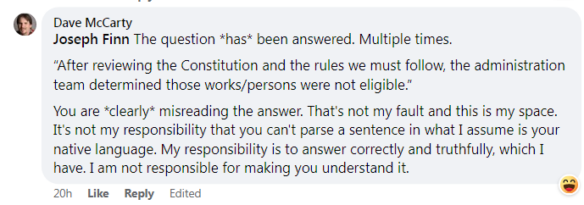
Clearly, Joseph Finn isn’t Tom Cruise, and Dave McCarty isn’t Jack Nicholson.
Yet it’s an innate part of human psychology to want to be understood and accepted by other people. The need is so strong that even the formidable McCarty had to make some effort to answer this question.
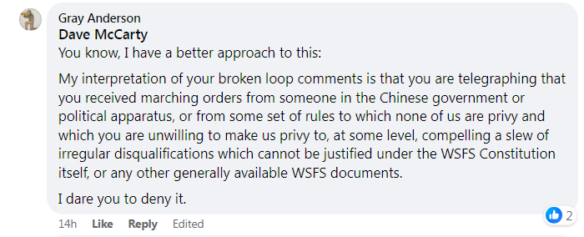
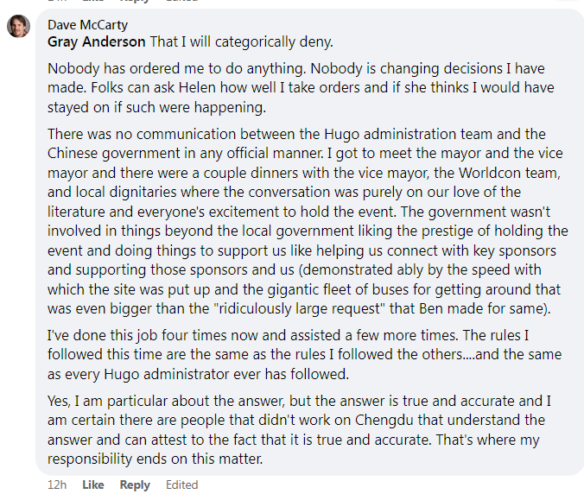
Neil Gaiman has been quite upset about what is essentially a Catch-22 explanation – the Sandman series was a Rule 3.8.3 casualty, but the individual episode that triggered the rule was also tossed as “not eligible”. Earlier today he had this exchange:
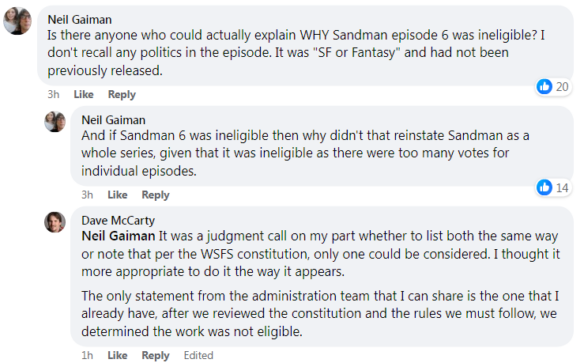
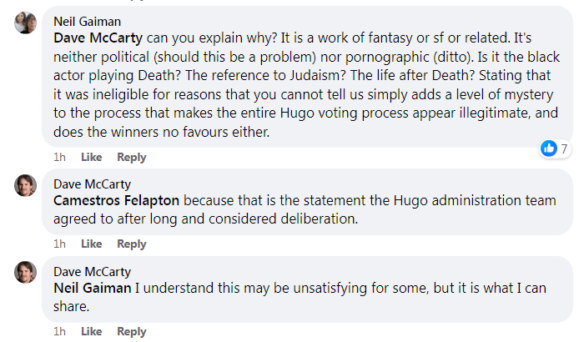
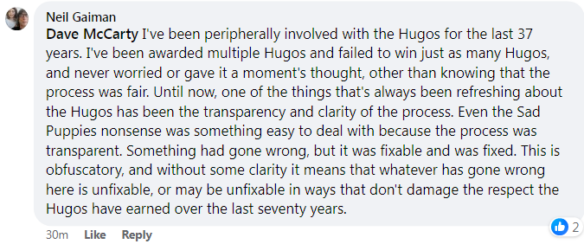
Silvia Moreno-Garcia replied:

When Jon Nepsha tried to lay some guilt on McCarty his friend Tammy Coxen stepped in with a heavy hint that there’s a more noble explanation, it’s just not being said out loud.
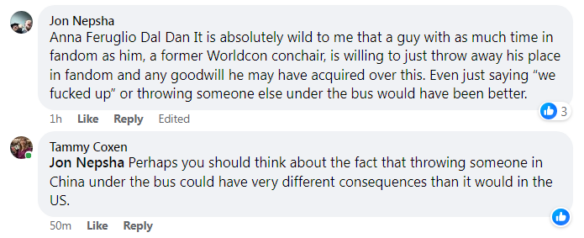

But McCarty himself has taken the opposite tack by defending the adequacy of the report.
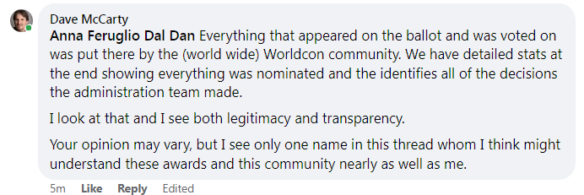
Discover more from File 770
Subscribe to get the latest posts to your email.

Pingback: What is Going On With the 2023 Hugo Awards? | Skeptic Society Magazine
That’s the most ridiculous thing I ever hoid!
I would be against rerunning the 2023 awards in any way. Despite the warnings, DisCon awarded the convention to Chengdu. I was a member of DisCon, but I didn’t participate in site selection, so I bear some responsibility too, if only a tiny bit, for not voting at all. DisCon members own this.
Michael Brooks: Your attachment of blame to DisCon members doesn’t seem reasonable to me. Of course I’m biased — I’m a DisCon III member who held his nose and voted for Winnipeg.
It was a weak bid in many ways, which is why it couldn’t get more support. (Then they won the NASFiC and didn’t do a good job with it, which seems to retrospectively justify the indifference to the bid.) Being “not in China” wasn’t enough reason for more than a few people to vote for Winnipeg.
And remember, in 2021, nearly 3000 residents of China bought supporting memberships in DisCon III, though only around 2000 of them ultimately voted in Site Selection. That’s a lot to overcome.
@A.P. Howell:
I feel like it’s important to note the asterisk on that site selection.
We didn’t have a Chengdu Worldcon because fandom rose up and decided it wanted a Chengdu Worldcon.
We have a Chengdu Worldcon because $240,000+ was spent to purchase supporting memberships (plus site selection fees) for 2400+ Chinese residents, ~1600 of which suddenly chose to become members in the last 10 days before the con, and which altogether produced the overwhelming majority of the 2006 to 807 site selection result.
You may choose to believe that these were real people spending their own money, or that someone got a government grant for $250k to rent Worldcon. Could be either one, and we’ll never know, not only because checking that kind of information isn’t something a con committee is really capable of, but also because an overwhelming number of these people did not–to my knowledge–submit anything other than a name.
Oddly, it should be noted that the ~2000 passionate Chinese fans who were somehow deeply educated about how to vote in site selection mysteriously disappeared when it came time to nominate for the Hugos.
There’s a lot of irony there, inasmuch as voting in site selection for a winning bid means you automatically get a supporting member, which comes with the right to submit Hugo nominations. If whoever bought these memberships had voted for them (or, if you’re a useful idiot and believe they’re real people, if whoever had put the effort into educating this genuine mob of fans to vote), the slate of Hugo-nominated works could have looked however they wanted it to look, and the current kerfuffle would have been completely avoided.
(The fact that the long/short DP categories are devoid of any homegrown Chinese SF/fantasy, of which there many popular Hugo-qualified works exist, seems like ample evidence to me that these people did not exist… and also some indication that whoever stage-managed the site selection exited the process at some point, which helps explain some things.)
That’s the weirdest thing to me. If someone wanted to subvert the Hugo process with the con committee being willing to look the other way, there’s several different ways that a competent person could have done so, which would have been completely above board on paper, and wouldn’t have given us the pig’s breakfast that we got.
Chengdu feels like a heist movie in which the mastermind gets bored and wanders off at the end of Act 1, and the whole thing turns into a farce.
Also, it needs to be stressed: If the Chinese government wants to spend another $250k at this year’s Worldcon, there currently exists no mechanism that would prevent Chengdu in 2026 happening. Or, you know, a 2026 Worldcon in Moscow, if you prefer a Russian threat.
The going rate to rent a Worldcon is $250k. The going rate to buy a Worldcon is $500k (so long as your country has two sites that are 500+ miles apart, you just need to buy/win site selection twice, then pack two business meetings, after which the WSFS Constitution says whatever you want it to say).
I’m not saying that this is a high-probability concern or that any countries are looking to do that. What I’m saying is that if you believe this could never happen, that there’s some mysterious provisions in the rules that would stop it from happening, that there’s some sort of council of grand elders who would step in and make it not happen… you need to go back and read the WSFS Constitution again, because none of that currently exists.
My memory might be off, but I recall the vote came out to around 1500 for Chengdu versus about 850 for Winnipeg? I could have that wrong, but certainly I recall a decent showing for Winnipeg, just not enough to counter the massive amounts of votes that came from China.
(I did vote for Winnipeg, and my main reason was actually For Winnipeg, in a silly self-serving way because my wife’s cousin lives up there and it’d give us an excuse to also visit.)
Chengdu got 1,950 votes that were submitted not at the con, and another 56 that were submitted at the con by voters.
Winnipeg got 332 votes submitted not at the con and 475 that were submitted at the con by voters.
Of the ballots received, 1591 pre-con ballots contained only email addresses, not street addresses, but were still counted. These included 1586 for Chengdu and 5 for no preference. The Site Selection committee also reported that an additional 917 people paid for membership in the 2023 Worldcon (which entitled them to vote in site selection) but did not submit ballots.
The WSFS Constitution includes:
4.4.1: Site-selection ballots shall include name, signature, address, and membership-number spaces to be filled in by the voter.
The site selection committee ruled that the “improperly” filled out ballots would not be counted. As a final odd step in an generally odd situation, though, the chair of Discon 3 overruled site selection, the addressless ballots were counted, and Chengdu in 2023 declared the winner.
@Andre:
Am I expected to believe that some part of the Chinese government has the resources and organizational ability to make up a couple thousand fake worldcon voters but at the same time does not have the resources and organizational ability to make up a couple thousand fake addresses to accompany them?
I’m also reminded of “Falsehoods Programmers Believe about Addresses”: https://www.mjt.me.uk/posts/falsehoods-programmers-believe-about-addresses/
@Brian: “f the Chinese government wants to spend another $250k at this year’s Worldcon, there currently exists no mechanism that would prevent Chengdu in 2026 happening. Or, you know, a 2026 Worldcon in Moscow, if you prefer a Russian threat.”
Nothing’s stopping New York City from doing the same thing either.
$250k is a lot of money for an ordinary person, but what’s to stop some cryptocurrency enthusiast who’s read maybe a little too much of a certain part of the genre from buying a Worldcon? What’s to stop Elon Musk from buying it, or having his legions of followers buy it?
“If the Chinese government wants to spend another $250k at this year’s Worldcon, there currently exists no mechanism that would prevent Chengdu in 2026 happening.”
Given that the license used to convey the right to use the Worldcon and Hugo marks is apparently an entirely unwritten implicit license, there’s nothing to prevent Chengdu in 2026 from happening without the need for anyone in China to spend $250K.
Try arguing that the implicit license was limited to one year, or for one purpose. There’s nothing written down, no terms laid out anywhere, nothing. In cases like this, it is almost certain that an arbiter is going to construe any ambiguity against the licensor, and an implicit license is nothing but ambiguity.
@Andre Lieven: As I understand it, Discon 3 completely complied with the first sentence of Section 4.4.1: “Site-selection ballots shall include name, signature, address, and membership-number spaces to be filled in by the voter.” And the ballots did indeed include those spaces.
The problem is that the WSFS Constitution didn’t say, and still doesn’t say, whether a ballot should be counted if the voter skips filling in some or all of those spaces.
To be clear, I’m not advocating for the literal-minded interpretation that the first sentence imposes an obligation on the administering convention only, not on the voters, but I do see where that interpretation came from.
Saying “spending $250K” isn’t really correct. Or at least lacks nuance. When they win, the money is cycled back to them as site selection membership funds. They only needed to be able to front this amount of cash and let it sit interest free in DisCon III’s coffers for a few months.
Of course, they also needed a 501c3 for the payout to keep it from turning into taxable income at the end.
Well, the whole mess has made The Guardian.
@Mike Glyer
“Of course, they also needed a 501c3 for the payout to keep it from turning into taxable income at the end.”
Does the IRS have sufficient jurisdiction over a foreign con-committee that it can tax their income?
@Bill
“Does the IRS have sufficient jurisdiction over a foreign con-committee that it can tax their income?”
For transactions happening in the United States, I would believe so.
If both ends of the transaction happen in the US, sure. But if I buy a rare book from a dealer in the UK, the UK dealer, with no US presence, isn’t liable for US tax on that income, is it? So if a foreign concom, with no US presence, receives pass-along funds, how would they be liable for US taxes?
That’s the question I’m asking.
Because you are paying any applicable UK taxes in your example given. Site selection happened in Washington DC and was administered by Discon within the US.
Bill: The IRS would have jurisdiction over a transaction taxable under US law.
Another handle the IRS had here was on the 501c3 that hosted DisCon III. They couldn’t just sit there and pretend it was okay for them to warehouse Chengdu’s money. And Chengdu would have constructive receipt of the funds even if they did, all events having happened that made Chengdu entitled to it. That’s one of several reasons Chengdu’s American officers went and set up a Wyoming non-profit corporation.
Longtime lurker, delurking…
Seems Dave McCarty is famous now. Or infamous…
https://www.theguardian.com/books/2024/jan/24/science-fiction-awards-held-in-china-under-fire-for-excluding-authors
Pass-along funds are a different case. Speaking about a US Worldcon run by a nonprofit, a 501c3 is allowed to pay for things that advance their exempt purposes or donate funds to another tax-exempt organization.
I do not see having a debate on whether or not a given country (or political subdivision like state/province/prefecture) should be able to host a Worldcon is a bad thing. If anything, it makes the proponents for making that site have to make their case, rather than just plonking down a few hundred thousand dollars to purchase an election.
Robert Thornton on January 23, 2024 at 2:56 pm said:
Not really. You think I’m happy about what happened? Of course not. But I don’t own a time machine. You can’t fix the past. You can only work on stuff that might prevent the same thing from happening again. See 2015. There were lots of people screaming for the Hugo Administrator to unilaterally disqualify works back then. But when it became clear that they couldn’t go back in time, they worked to adopt rules that they collectively thought would prevent the 2015 “failure mode.” So now we have a different and unrelated failure mode identified, and thus we have to consider what we do going forward, because going backwards isn’t going to happen.
A. P. Howell on January 23, 2024 at 3:11 pm said:
I haven’t. But are you saying that we should have a rule that “No site shall be eligible to that [broad statement of principle]” and then leave it up to whoever is administering that year’s Site Selection to make the subjective judgement call that a given bid doesn’t meet that standard? If so, great, that’s a defensible position. In effect, you’re putting the eligibility decision in the hands of the Chair of the administering convention, based on existing precedent. Is that what you want?
Administrators have to make judgement calls about the validity of the documents presented by a bid. I had to do that in 1992 when I administered the “snap” NASFiC election. (The full story is much too long to include here.) The not-that-serious “I-95 in ’95” bid presented me with an organizing document that was remarkably silly, but I ruled met the technical rules for a governing document. (Excerpt: “The Chair is in the Lobby of the DC Sheraton. The Board is a piece of wood.”) However, the facility agreement purported to be a letter addressed to the Secretary of Transportation saying, more or less, “Can we use I-95 to hold our convention in the rest areas?” with a rubber stamp that said, “Benny the Shiv says OK.” I ruled that their facilities agreement was technically insufficient. That’s why they weren’t on the ballot. They did manage to talk the night clerk at a DC-area hotel into reserving a single room for them and faxing the reservation to them. With one second left before the filing deadline, they dashed across the floor of the convention center and gave me the document. I showed it to Tom Veal, my deputy, and we both agreed that while it was weird, it was also technically sufficient, that we’re not allowed to subjectively judge whether it would be a good location, and so allowed their bid as a validly filed write-in. (They didn’t win, but they placed ahead of one bid that was on the ballot.) So don’t suggest that I don’t know what Site Selection administrators are empowered to do.
Back during 2015, there were proposals that would have explicitly put more subjective judgement into the Hugo Award Administrators’ hands. These were rejected because people wanted a mechanical solution that wouldn’t require an individual or small group of individuals to exercise subjective judgement. Restricting Worldcon sites to specific countries similarly is a mechanical solution that doesn’t require the entity supervising the election to exercise subjective judgement.
I have no problem with such a proposal to go down to the state/provincial/prefectural level if that is what people want. Personally, I’d put at keep Florida and probably Texas off that list of eligible locations. (That’s only mentioning US states that have hosted Worldcons.) What other US states would you propose excluding? What Canadian provinces? (Three have hosted Worldcons historically.)
They are separate issues. You are welcome to introduce such proposals yourself. I will help you compose them in the correct form if you want me to do so. (Personally, I think if you want to be fair, you’re going to need to ban anyone who was on the 2023 Hugo Administration Subcommitte, although you personally may think that shooting one person is sufficient, I do not see having a debate on whether or not a given country (or political subdivision like state/province/prefecture) should be able to host a Worldcon is a bad thing. If anything, it makes the proponents for making that site have to make their case, rather than just plonking down a few hundred thousand dollars to purchase an election.
Robert Thornton on January 23, 2024 at 2:56 pm said:
<
blockquote>@ Kevin Standlee
As far as what happened to the Hugo Awards in 2023, your attitude seems to be “so it goes.” Is that fair?
<
blockquote>
Not really. You think I’m happy about what happened? Of course not. But I don’t own a time machine. You can’t fix the past. You can only work on stuff that might prevent the same thing from happening again. See 2015. There were lots of people screaming for the Hugo Administrator to unilaterally disqualify works back then. But when it became clear that they couldn’t go back in time, they worked to adopt rules that they collectively thought would prevent the 2015 “failure mode.” (Whether the adopted the right rules is a separate debate.) So now we have another failure mode identified, and thus we have to consider what we do going forward, because going backwards isn’t going to happen.
A. P. Howell on January 23, 2024 at 3:11 pm said:
I haven’t. But are you saying that we should have a rule that “No site shall be elgible to that [broad statement of principle]” and then leave it up to whoever is administering that year’s Hugo Award to make the subjective judgement call that a given bid doesn’t meet that standard? If so, great, that’s a defensible position.
Back during 2015, there were proposals that would have explicitly put more subjective judgement into the Hugo Award Administrators’ hands. These were rejected because people wanted a mechanical solution that wouldn’t require an individual or small group of individuals to exercise subjective judgement. Restricting Worldcon sites to specific countries similarly is a mechanical solution that doesn’t require the entity supervising the election to exercise subjective judgement.
I have no problem with such a proposal to go down to the state/provincial/prefectural level if that is what people want. Personally, I’d put at keep Florida, and probably Texas off that list of eligible locations. (That’s only mentioning US states that have hosted Worldcons.) What other US states would you propose excluding? What Canadian provinces? (Three have hosted Worldcons historically.)
They are separate issues. You are welcome to introduce such proposals yourself. I will help you compose them in the correct form if you want me to do so. (Personally, I think if you want to be fair, you’re going to need to ban anyone who was on the 2023 Hugo Administration Subcommitte, although you personally may think that shooting one person is sufficient, pour encourager les autres.)
Do you really think that banning a single person will solve the underlying issue? So when (probably not if) a country with a sketchy history of respecting human rights and freedoms comes along and thousands of people from that country all join the convention conducting site selection with something eerily similar to consecutively numbered money orders, we won’t have exactly the same thing happen again?
mark on January 23, 2024 at 6:14 pm said:
I’m sympathetic to this; however, I personally do not think that proxy voting or 1000-person Zoom calls are a solution. I tried to get us to adopt Popular Ratification in order to let the non-attending WSFS members have a say in the ratification of proposals, but it was first watered down and then rejected entirely. How to get the existing Business Meeting to vote away any part of its authority is very difficult, and I don’t know how to address that.
Carole Parker on January 23, 2024 at 7:31 pm said:
Who decides whether a bid is allowed on the ballot according to the general statement?
Mike Glyer on January 24, 2024 at 8:22 am said:
Only half of it. They have to join the administering Worldcon as a WSFS (supporting) member, and the administering Worldcon gets to keep the money. Is that not an incentive for the administering Worldcon to look the other way about any irregularities?
.)
Do you really think that banning a single person will solve the underlying issue? So when (probaly not if) a country with a sketchy history of respecting human rights and freedoms comes along and thousands of people from that country all join the convention conducting site selection with something eerily similar to consecutively numbered money orders, we won’t have exactly the same thing happen again?
mark on January 23, 2024 at 6:14 pm said:
I’m sympathetic to this; however, I personally do not think that proxy voting or 1000-person Zoom calls are a solution. I tried to get us to adopt Popular Ratification in order to let the non-attending WSFS members have a say in the ratification of proposals, but it was first watered down and then rejected entirely. How to get the existing Business Meeting to vote away any part of its authority is very difficult, and I don’t know how to address that.
Carole Parker on January 23, 2024 at 7:31 pm said:
Who decides whether a bid is allowed on the ballot according to the general statement?
Mike Glyer on January 24, 2024 at 8:22 am said:
Only half of it. They have to join the administering Worldcon as a WSFS (supporting) member, and the administering Worldcon gets to keep that money. Is that not an incentive for the administering Worldcon to look the other way about any irregularites?
Well something went wrong when I went back to fix something and time ran out to fix it again. Sorry
The Guardian article noted by Madame Hardy and Inge is pretty good. It’s nice to see Paul Weimer getting mentioned and quoted. And Dave McCarty…comes across as Dave McCarty.
@Kevin Standlee:
Now you sound exactly like McCarthy! 😉
Just a side issue, probably, but how weird is it, that the only official infos on this kerfuffle is trickling down from McCartys Facebook page? What happens if he locks or deletes it, bc he gets tired of inquiries?
“My Hugo acceptance speeches would have gotten me arrested in China. I have said things on record that are just illegal,” said the writer Jeannette Ng in 2021.
Yup…
https://www.ineligibledave.com/ tracks the number of days that questions about eligibility have been unanswered (spotted here https://bsky.app/profile/winnie-writes.anticapitalistcatgirl.com/post/3kjmfetri4d2f)
I mean, very little actual information would be lost.
Dave McCarthy knows more about the WSFS Constitution than anybody else; the Hugo shortlist followed the rules; he has already explained everything to his satisfaction.
That’s it.
Instead of trying to craft specific rules of exclusion, wouldn’t it be a better objective to craft a rules of bid eligibility that are geared toward ensuring that Worldcon doesn’t take place somewhere where there’s a distinct possibility of either censorship meddling in the results or risk to attendees? Decide which human rights index or risk assessment you want to use as your standard: Amnesty International, CATO Institute’s Human Freedom Index, the World Press Freedom Index (WPFI) – all of these are well-documented, well-known organizations that do thorough research for their reports. Determine a minimum passing score. Bids from countries that do not meet the minimum requirements are not eligible. This doesn’t exclude any particular country specifically, and allows for adjustment in the event of countries improving or not improving their ability to guarantee safety for members and freedom of expression at Worldcon. It should not be up to the individual site selection committee to decide this, it should be up to the MPC, which really should be actually governing the use of the Hugos through written licensure agreements, and it’s quite frankly astonishing they’re not. In the event that a Worldcon bid wins which is determined not to meet the minimum standards of “licensing the Hugos,” it’s just not allowed to host the Hugos. This would be a big change and would mean that an alternate way of awarding the Hugos would need to be come up with, but it’s vastly better than “this was bad, we know it was bad, but we simply can’t do anything about it because we have no control over our own trademark (YIKES).”
@Farasha
As I’ve heard it explained in this livestream discussion between trademark lawyers on this topic – https://www.twitch.tv/videos/2041831211 – If you do not enforce a set of standards on those you licence your trademark to, you no longer have a trademark. The chair of the corporation that owns the trademarks making public statements that the corporation has no control what so ever over the entities that the trademark was licensed to, can be construed as trademark abandonment.
Instead of trying to exclude certain Worldcon locations, why not simply have a rule that Hugo administration is not done at the location of the Worldcon, but is instead administered in the same predesignated location every year.
The Hugo marks are registered to a California nonprofit. Just have the WSFS rules state that the administration of the award – the vote counting, the eligibility determinations, and so on, are done in California, using the WSFS rules set out in the WSFS Constitution as defined under California law. The Worldcon hosts the presentation of the award, but that is legally distinct from and not the location of the administration of the award.
Does anyone here know why the nominating data isn’t released until the end? An extra layer of transparency somewhere would have been an extra step in preventing this issue.
Releasing all of the nominating data would unfairly effect the final voting. There was a proposal for 3-stage voting several years ago which would have added a middle stage between nominations and final where voting on a longlist would have created the shortlist. But at least that iteration of it failed.
eta: but maybe that idea is worth looking at again now.
@Jon Nepsha
Ordinaraly, the Nomination Data is released shortly after the awards during the Worldcon it’s self. It’s not released beforehand, to avoid colouring people’s choices on the ballot.
However, had the Nomination Data been released during the Chengdu Worldcon, then an embarrassing point of order might have been raised on the Sunday Business Meeting.
Isn’t that because they don’t want a work’s nomination numbers to affect its final votes? They don’t want people going, “Hey, work A got so many more noms than the work I liked, so I must be wrong about their relative quality and vote for work A in the finals”?
This is a problem that would be solved by getting an outside third party to do the tallying of all the votes throughout the whole process.
As a failsafe, would it be fair and acceptable to appoint someone (In my mind, the con chairs of recent and future Worldcon’s) to review the nomination stats and data somewhere in the process and sworn to secrecy? For example 2023 would be administered by the 2023 team, but be reviewed by the con chairs of 2021-2024?
While it’s very difficult for WSFS to respond to anything that happens with the Hugos, taking at least 2 business meetings, I do believe these events should not go without a response. At the very least, the simple act of works being disqualified without administrators being willing to cite under what rules or principles they were disqualified earns those categories a permanent asterisk in the history books, and even the impossible-to-do-fairly step of a re-vote.
The reason for such an effort is to express a deterrent to any future countries or committees who should feel that taking such steps to comply with local regulations will result in shame for the committee and the host nation, and more attention to the disqualified works than they would otherwise get. This might not deter a nation whose only goal is to say, “No way author X saying Y gets an award in our country, even if the awards get an asterisk” and I am not sure how to deter that, other holding the awards in a country with censorship laws again.
But in the meantime China should be shamed, and this Hugo committee should be shamed — even though they may have had no choice, other than to resign. It should not be the case that they “get away with it” and it goes unresponded to.
An investigation into the particulars could compromise Chinese residents, so it may not be able to happen. Rather the facts on the ground — works disqualified with refusal to explain the reasons — are already sufficient to earn the asterisk or re-vote. Though it would be good if the asterisk were able to explicitly name Chinese censorship as the reason, though that will take more work.
One of the advantages of that 3-stage voting proposal was that it would crowd source the checking of eligibility and making potential finalists aware.
Laura: You shook loose a memory. In decades past Hugo administrators would run the prospective finalists past Charles N. Brown of Locus for his review of their eligibility and that they were in the right length-category. It would be surprising if they haven’t continued to do something comparable. But in those halcyon days the literary metrics were the only concern….
@Kevin-
If I may, reading your responses here, I want to point out a trend in your posts that may or may not be your intent, but is certainly is the vibe you’re giving off.
Namely, this is what your posts feel like they’re saying– both now and most of the times in the past when similar issues have raised their heads:
1- That because nothing was done about a problem, your statements imply that nothing could or should have been done.
2- That because the rules don’t account for circumstances that caused the problem, your statements imply that not only should no action have been taken, but that it’s absurd to suggest actions that aren’t explicitly outlined within the rules.
3- That because the organization has been designed to not empower any person or group with oversight power to step in when obvious problems occur, this is good and right and how things should be.
4- Biggest of all, your statements imply you see the difficulties inherent in fixing these problems, because of the convoluted and byzantine nature of WSFS governance, as features rather than bugs, that it’s a GOOD thing that it’s hard to fix and change things.
I’d like to think that none of the above represent how you actually feel, but I don’t know.
Kevin, Marshall
The WSFS rules are designed to not allow rapid and in particular unilateral response to problems. There is virtue to that, but also problems and inflexibility. Being able to respond immediately to the puppies would have made WSFS better, but we’ve been unable to create a way to do that without its own problems.
I have been musing over the idea that more authority could be given, either to an individual concom, or a single business meeting, to take quick action, so long as there is strong agreement that their quick action can be almost entirely reversed. Ie. “You can apply a quick fix as long as there’s an undo button the next business meeting can press.”
Today, an amendment requires a ratification and then the change will take effect 2 years after the problem arises. That’s useless in an OODA loop against more dynamic adversaries like the puppies. With an “undo” option, the first Hugo committee to face a slate like the puppies could have said, “We’ve detected an attack. This year the ballot will have more finalists on it, the union of the slate and the organic nominees, and you can rank them all. Later, if the business meeting votes to undo our action, we can generate a result as though only the top 5 nominees made it.” This isn’t a perfect undo in that people do vote in the knowledge of the “just-missed” candidates but not which are which, but it’s pretty good. In a typical year, a business meeting might vote to undo before the Hugo ceremony, which would mean some rapid switching of nameplates — you already engraved both sets of winners — and it would be an almost total failure for the attackers, instead of being one of the biggest crisis events in Hugo history as it was.
Indeed, for the Hugo awards, as long as you are willing to allow a few extra entries on the ballot and that slight bit of information, it’s not too hard to undo almost any change. For things like site selection, the undo is expensive and must be decided quickly. For example, had site selection admins decided to disqualify supporting memberships without proper addresses, you would need to get that decided right there. You would like to have some reasonable way for an independent party to judge the quality of the “undo” to allow only things that can be 95% undone in the eyes of an independent party, at least if a committee is doing this. If a business meeting wants to pass a resolution of immediate change, you might require 51% for that, but to have 2/3rds agree that the undo formula is suitable and the next year’s business meeting can not just fail to ratify, but decide to undo. Indeed, most changes might end up being proposed so that they take effect quickly but can be undone, and the next year’s meeting either ratifies and makes permanent or undoes — or possibly doesn’t ratify but also doesn’t undo if it sees fit.
Brad- Just to be clear, I am aware of how the system works. I’m saying, there’s a difference between a tone of “This is how the system works, so we’ve got a lot of work ahead of us to get this fixed” and “This is how the system works, so NOTHING CAN BE DONE AND WHY BOTHER”. And my larger point is, Kevin’s INTENT might be the former (and I truly think it is!), but the way a lot of people are interpreting what he’s saying is the latter.
@Jay Blanc
I have heard (and watched) the same, which is why I’m so concerned over the apparent assertion of “We’ve tried nothing and are all out of ideas.” From what I’m understanding, the current state of the Hugos relies on security through the confidence that nobody else wants to run this thing and so nobody has bothered to try. Otherwise, it might very well be in hostile hands by now.
Bare minimum: Written standards of what constitutes proper administration of the Hugos. Minimum venue standards, minimum guarantee of rule-following regarding nominations and voting, how Hugos branding can be used and in conjunction with what (wow, this might have prevented the Raytheon scandal, who would have thought), accommodation requirements for all finalists, oversight and transparency requirements for balloting, etc. License agreements are so standard for the use of trademarks that it simply boggles the mind that this doesn’t exist.
From my understanding as well, the legal standard of defending the mark in this case might be fully met by disclaiming the 2023 results as improperly handled. It would convey that the Hugos continue to have a standard of services (pretty required to retain the mark) and that this doesn’t meet them. This would be very painful for the winners of the 2023 Hugos, and it would definitely stink. But at this point it almost seems like a legal responsibility to do so (IANAL).
You could imagine the mark protection committee, which administers the Hugo mark, trying to claim these Hugos were not conducted properly and thus are not entitled to use the mark, but I think there would be a good claim that this sort of power is not intended to go to this committee. (It is a popular committee because WFSFs has almost no standing roles, and many people wish to have some sort of standing role with WSFS, so its few committees are the closest thing to a PFWC.) But a PFWC has been resisted, though people are suggesting the Hugos could need something like one. But it’s nice to imagine solving these things without one. Our problem is we’ve gone too far in the other direction. Requiring 2 years to make any WSFS decision does help slow down change, but it also makes the system fragile to genuine attackers.
It’s not clear what could be done here though. When it as clear to the Chengdu Hugo committee that Chinese rules would corrupt the process, what options were open? They could have resigned, the main concom now responsible. Could it declare they would punt on their constitutional requirement to award Hugos? Might that get them in trouble with Chinese authorities? What would happen if they had appointed an all-foreign hugo subcommittee? Could they have award Hugos to nominees unacceptable to the CCP without getting in trouble?
Our takes-two-years process might deal with that, a way for a bid to say, “we want to host the con but we can’t host the Hugos” But would that have worked?
Hugo committees resigning is almost a tradition now. Didn’t Discon lose 2 whole Hugo committees (and a couple of Chairs)?
I don’t disbelieve you, but I’m afraid my brain has had a slight short at the Mark Protection Committee that has “mark protection” in their name and ostensibly exists for the purpose of protecting the trademark not being intended to have the power to protect the trademark.
I need to go sit.
Brad Templeton: You could imagine the mark protection committee, which administers the Hugo mark, trying to claim these Hugos were not conducted properly and thus are not entitled to use the mark, but I think there would be a good claim that this sort of power is not intended to go to this committee.
Farasha: I don’t disbelieve you, but I’m afraid my brain has had a slight short at the Mark Protection Committee that has “mark protection” in their name and ostensibly exists for the purpose of protecting the trademark not being intended to have the power to protect the trademark.
The MPC does engage in protective activities. You can read about actions they’ve taken in the annual WSFS Business Meeting minutes, because they submit a report annually to that meeting.
In the past, when infringements have occurred, they have sent polite request letters, which when ignored were followed up by Cease and Desist letters from their IP attorneys. I think there may have been a case in the past where their lawyers had to get more aggressive than that to get the infringement to stop. And they periodically have to submit evidence that the marks have been maintained (i.e., that they are in active, current use on the WSFS and Worldcon websites and activities).
If they got wind ahead of time that the 2023 Hugo Awards were being improperly administered, the MPC might have had standing to revoke Chengdu’s use of the Hugo Award name. But even if they had done that, do you think the Chinese Worldcon would have complied? Do you think Dave McCarty and Ben Yalow would have complied, given their arrogance in promoting the Chengdu bid while promising that they could run a clean Hugo Awards program?
Now that they are a fait accompli, I don’t believe the MPC has the authority to declare the 2023 Hugo Awards null and void, however.
As a side note, both McCarty and Yalow are currently on the MPC, with terms ending in 2024 and 2025, respectively. I hope that there are WSFS members who will be willing to run against them at the Glasgow and Seattle Business Meetings, should they have the sheer audacity to run again when their terms are up (which they probably do).
I do also believe that the WSFS Business Meeting has the ability to pass a resolution censuring McCarty and Yalow for orchestrating this travesty. It wouldn’t have any teeth other than “strong condemnation”, but I’d like to see that happen.
I mean, shouldn’t the absolute bare minimum consequence of this be that they’re ejected from the committee for this fiasco?
I think the actions of the Mark Protection Committee have been limited to dealing with people are are not WSFS making unauthorized use of the marks. The idea of the MPC saying to the actual seated concom or Hugo subcommittee that “You have not conducted yourself as we think a concom should, and violated the constitution, thus even though you are WSFS you must not use the marks” would be a considerable expansion of traditional powers. You can argue it in theory but in practice it’s a big jump. It turns them into a sort of supreme court, judging the constitutionality of actions, and I don’t think that’s the intention.
Now, should there be a “supreme court” that can indeed make rulings? Well, that’s sort of the business meeting, though those can only make binding changes to the rules with resolution and ratification, and that takes 2 years. I get the sense we don’t want a supreme court of WSFS (and wanting to be on it would be instant disqualification from being on it in my view) but I do think it’s reasonable to find ways to respond to attacks in less than 2 years.
As for McCarty and Yallow — I think McCarty has indeed (possibly knowingly and with regret) burned bridges to future involvement with the Hugos and WSFS. I have not seen any particular allegations about Ben, but I haven’t looked closely and I didn’t go to Chengdu. In theory the concom, which he co-chaired, delegates complete authority to the Hugo subcom, which might insulate him from this scandal, but I don’t know if there are specific allegations otherwise. He certainly accepted the role of co-chairing Chengdu though, knowing the risk of shitshow. I don’t want to punish people just for trying to engage with China, but they should be ready for what happens, and resign if lines are crossed. If he was aware of this and didn’t resign, I would want to know why.
Can the meeting do that in only one session?
(Rhetorical question)
Well, in the absence of any written license agreement, who knows what’s enforceable. That’s part of the problem. As I said, I’m not an IP attorney.
If I were a person in the position of protecting the integrity of the Hugos service mark (part of which involved ensuring that the services rendered meet the standards of the mark), my very first step after learning of fuckery would be “call an IP attorney and ask what can be done,” which plainly did not happen, since Kevin went on to make public remarks that every IP attorney on Bluesky promptly screamed at him to stop making.
JJ:
If this is the case, then, as many people including actual lawyers have pointed out (see the discussions on Bluesky), the MPC is failing at their job. To my understanding, when they license out the use of the “Hugo Award” trademark out to each individual Worldcon, there should be terms and conditions requiring that Worldcon to adhere to the MPC’s rules surrounding the use of the trademark. If the Worldcon fails to meet those rules (for example, by rigging the votes and giving out the awards unfairly), then it should be possible for the MPC to declare that they have failed to adhere to the license. They may not have the money to actually sue Chengdu, but they should be able to point to the license they gave Chengdu and say “they violated these rules in a way that damages our brand, so this is not a legitimate use of the Hugo Awards trademark”.
Unless, of course, they didn’t bother to lay out any rules when licensing out the use of the trademark (or didn’t provide an explicit license at all), in which case Chengdu and any other Worldcon could do literally anything they like with the “Hugo Award” trademark and the MPC would have no recourse to stop them. Is that what you’re suggesting?